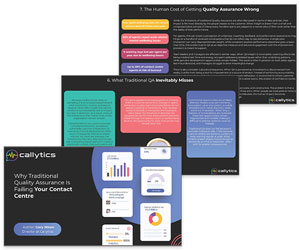What can contact centres do to simplify and automate their operations, CX, and employee experience? To find out, we asked our panel of experts for their best advice.
1. Use Software to Automatically Approve or Reject Holiday Requests

Remove all the tedious manual admin that Planning teams get bogged down with by using AI to continually monitor actual customer demand and agent supply to re-forecast and understand the impact of changes to the schedule.
Shift and break moves, holiday requests, and absences can all be automatically approved or rejected based on the impact to service levels – freeing up Planning teams for analysis and more valuable work.
Contributed by: Simon Beck, Head of Sales, QStory
2. Create Rules to Target Conversations for QA

Quality processes are the logical place to begin with applying automation, because typically these processes are still very manual and also an expense to every business.
They are, however, necessary to ensure customer expectations are met and any potential experience issues are mitigated before they lead to customer churn.
The most logical place to add automation is within the evaluation sample. Create rules that identify the most impactful conversations, so you are focused on interactions that represent most of the business.
But also leverage data around topics and sentiment, so you can focus on the types of conversations that you need to develop your teams to handle.
Contributed by: Chrissy Calabrese, VP Product Marketing, Playvox
3. Adopt Digital Intelligence to Spot Slow Processes

The latest workforce force management (WFM) solutions offer advanced reporting. When WFM is combined with automated quality management (QM) the consolidated intelligence can become a customer and employee command centre, with scheduling and quality intelligence in one place.
This is a way to aid decision-making for contact centre leaders, allowing them to make meaningful changes to services and products.
Meanwhile, behind the scenes, sophisticated desktop analytics deliver vital digital intelligence by unearthing any slow or badly designed applications, systems and processes that make agents’ lives harder than they need to be.
Contributed by: Paul Stemp, Supervisor, Customer Success Management, Calabrio
4. Use Self-Learning Forecasting Algorithms for Super-Accuracy

AI, machine learning, and predictive analytics are revolutionizing the way WFM tools forecast workload and create schedules.
Producing an accurate forecast that considers intraday, weekly, monthly, and seasonal patterns is not a trivial task. In the past, the solution was to spend a huge amount of time on forecasting or take time-saving shortcuts that resulted in inaccurate results.
The self-learning forecasting algorithms built into modern WFM systems deliver super-accurate forecasts with almost zero effort.
The same applies to creating schedules that are optimized around demand. Building and updating schedules used to be an onerous task.
Modern WFM applications automatically generate schedules that deliver perfect workload fit, while complying with legislation and preferences, even in a complex multiskill, omnichannel set-up.
WFM systems with an API (application programming interface) enable reports and dashboards to be generated automatically, saving lots of time for the planning or management information team.
Contributed by: Chris Dealy, WFM Evangelist, injixo
5. Automate the QA Process
Quality assurance (QA) is one of the most important tools for contact centre management looking to improve operational efficiency, maintain customer-centric standards and drive better agent experiences.
But today, most organizations have a large disparity between the number of QA analysts, supervisors and contact centre agents, making it a perfect area for automation.
With automated QA on up to 100% of contact centre interactions, contact centre leaders can more effectively understand key metrics like script and process adherence, compliance issues, first call resolution, and more.
Furthermore, when you reduce tedious manual processes, like manual QA, you enable your QA staff and contact centre supervisors to spend time on more meaningful tasks, like agent coaching and performance improvement at scale.
Contributed by: Frank Sherlock, VP of International, CallMiner
6. Predict Demand With Dynamic Forecasting

To simplify and automate their operations, contact centres should prioritize dynamic forecasting. This allows contact centres to accurately predict future demands without deep technical expertise, ensuring that staffing and scheduling align with real-time needs.
Adaptable forecasting, which leverages both standard and custom models, guarantees precision while accounting for seasonal variations and unique patterns.
By addressing outlier occurrences and permitting manual adjustments for unforeseen events, contact centres can stay ahead of changes.
For digital communications like email, it’s vital for your forecasting capabilities to consider both historical and predicted backlogs, tailoring support according to specific business hours.
This approach not only streamlines operations but also significantly enhances both customer and employee experiences, positioning the contact centre for continued success.
Contributed by: Briana Tischner, Product and Partner Marketing Lead, Assembled
7. Use AI to Spot Agent Development Opportunities

Beyond the traditional AI of tagging and sentiment analysis, sophisticated platforms are harnessing generative AI to consider everything from agent responses, to wider context, to automatic scoring.
Generative AI in QA is able to give reasons why it has scored something the way that it has and even provide suggestions for improvements.
It’s like having a clever co-pilot for your evaluators. Ultimately, it’s up to them whether they choose to use those insights or not, but doing so will effectively boost their productivity, since they’re able to achieve much more coverage in less time.
With so many angles to automation, you’re spoilt for choice on which strategies you choose to employ.
Assess where your contact centre’s particular pain points lie and see if they could be rectified by reducing the opportunity for human error or bias, then build up from there.
Contributed by: Chris Mounce, Digital Training and Enablement Specialist, EvaluAgent
8. Deploy Chatbots to Handle Routine Enquiries
Using omnichannel technology can consolidate all customer interactions, offering customers a choice of channels while ensuring a seamless and consistent experience across platforms like phone, chat, email, and social media.
AI-powered chatbots can efficiently manage routine customer enquiries, enhancing response times and allowing human agents to concentrate on more complex tasks.
By looking at the data from customer interactions through speech analytics, we can learn more about what customers like and don’t like and use that information to enhance agent training and customer experience.
Finally, utilizing tools such as workforce management technology to manage employees’ schedules and performance ensures contact centres have correct staffing levels and support to reduce strain on agents, improve waiting times, and handle queries effectively.
Contributed by: Ben Booth, CEO, MaxContact
9. Assist Agents With Real-Time Guidance

Ensuring optimal customer experience (CX) starts with your contact centre agents. As live interactions grow more complex, agents may experience increased stress and burnout, leading to reduced productivity and higher turnover.
Harnessing AI-assisted agents can greatly improve operations, CX, and employee experience by:
Providing Real-Time Guidance and Automation
Real-time guidance and automation features can assist agents during customer interactions. This reduces response times, streamlines operations, and improves CX.
Automation also minimizes after-call work, easing the agent’s workload and enhancing their experience.
Using Transcription and Summarization of Customer–Agent Conversations
This can reduce contact handling times, provide efficient operations, and improve CX. AI-assisted agents can ensure consistent, accurate call summaries, saving agents time on post-call activities.
Suggesting Actionable Insights for Leadership
Managers are enabled with comprehensive dashboards to monitor KPIs and review call recordings and transcripts. This empowers leaders to make data-driven decisions and optimizes operations.
Contributed by: Sarika Prasad, Senior Product Marketing Manager, Five9
10. Use AI for Generating Wrap-Up Notes

Automating administrative and repetitive tasks with robotic process automation (RPA) can also improve the employee experience.
Agents can focus on meaningful interactions rather than administrative chores, which not only reduces employee frustration but also increases operational efficiency as RPA handles tasks like data entry and paperwork.
A great example of this in the contact centre is automated call transcription and AI-generated wrap-up notes, which allows the agent to skim through a log of the conversation with the customer, saving time writing post-call notes.
Contributed by: Finlay Macmillen, Business Development Representative, Odigo
If you are looking for more on improving and simplifying the contact centre, you should read these articles:
- 25 Ways to Improve Your Contact Centre Operation
- 23 Key Processes Call Centre Automation Can Simplify
- Recorded Webinar: Simplifying and Automating the Contact Centre
For more great insights and advice from our panel of experts, read these articles next:
- 5 Ways to Improve Capturing Customer Details
- Get Up To Speed: The Latest on Messaging, Social Media, and Video
- 10 Tips, Tools, and Techniques for Improving Intraday Management
Author: Robyn Coppell
Reviewed by: Xander Freeman
Published On: 27th Nov 2023 - Last modified: 2nd Sep 2025
Read more about - Technology, Artificial Intelligence (AI), Ben Booth, Briana Tischner, Calabrio, CallMiner, Chris Dealy, Chris Mounce, Chrissy Calabrese, EvaluAgent, Finlay Macmillen, Five9, Forecasting, Frank Sherlock, MaxContact, Odigo, Paul Stemp, Peopleware, Playvox, QStory, Quality, Sarika Prasad, Simon Beck, Staffing, Top Story





















